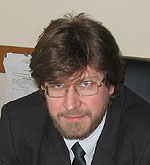© «Russia in Global Affairs». № 2, April —
June 2006

The arrival of spring was marked by several anniversaries in
Russia and the world. Sixty years ago, Winston Churchill delivered
his famous speech in Fulton, which is generally viewed as the
beginning of the Cold War. Other notable dates include the 75th
birthday celebrations of two famous statesmen – the first president
of the Soviet Union, Mikhail Gorbachev, who put an end to the Cold
War, and the first president of post-Soviet Russia, Boris Yeltsin,
who put an end to Soviet Communism. Finally, Russia acknowledged
the 50-year anniversary of the 20th Congress of the Soviet
Communist Party, which made the first attempt to liberalize Soviet
society decades before Gorbachev and Yeltsin.
How relevant are those historical dates to our present times?
Quite relevant, I must say, since the consequences of those events
still have an effect on our lives today. This is the general belief
of the contributors to this issue, who provide an in-depth analysis
of the “echoes of history.” “Since Communism held the reins of
state power for 70 years, its contribution to the country’s
transformation is crucial for understanding Russia’s past, as well
as its future,” maintains Anatoly Vishnevsky.
The Cold War was largely a result of a mutual misunderstanding
between two former allies – the Soviet Union and the United States.
Each party imagined aggressive intentions on the part of its
opponent, which, in reality neither really had, argues historian
Vladimir Pechatnov. Today, the issue of mutual understanding
between Russia and the West is a relevant topic once again, Sergei
Karaganov believes. “We have gone through the tragedy of
confrontation. We should not get ourselves involved in a farce as
well,” he points out. State Duma Deputy Konstantin Kosachev writes
about the inertia of thinking among Western politicians who prefer
to follow the habitual path and view today’s Russia as an enemy.
Dmitry Furman comments on the present Russia-West confrontation for
influence in the post-Soviet space. He views this confrontation as
a continuation of the Cold War that was waged by the West and the
Soviet Union, only now it “entails a smaller space and a different
alignment of forces.” Arkady Moshes, Leonid Grigoriev and Marsel
Salikhov analyze Russia’s positions in Ukraine, a key post-Soviet
state.
Vitaly Shlykov writes that at the dawn of reforms Russia missed
an opportunity to turn the Soviet economy, overly militarized in
the Cold War years, into the engine of an economic miracle. Now
Russia has a second chance, and in order not to miss it again, it
must analyze its former mistakes. Gavriil Popov points out that the
inability to learn from one’s own mistakes results in their
recurrence with more serious consequences. He argues that the
Russian authorities have not learned the lessons from the
unsuccessful attempt to transform Soviet society, made by Nikita
Khrushchev 50 years ago. Vladimir Mau warns about the dangerous
sense of euphoria due to the favorable situation on the energy
markets, rather than achievements in economic reforms.
Does Russia need to orient itself to some specific model for its
development? Our country borders two powerful centers of economic
gravitation, the European Union and China, each representing a
different model of social, political and economic system. Today,
Russian analysts have resumed heated debates as to which path to
follow – the European or Asian variety.
Nadezhda Arbatova and Timofei Bordachev discuss ways for Russia
to build its relations with the EU, especially as the Russian-EU
Partnership and Cooperation Agreement is set to expire in 2007. The
choice of a future model for the parties’ mutual relations will
largely shape Russia’s further development. Sergei Porshakov
analyzes one of the aspects of orientation to Europe, namely
corporate governance models in Russia and the EU.
Vladimir Portyakov compares the economic potential of Russia
with that of China and India, two countries that are now in the
focus of analysts around the world. The author names the more
probable areas for cooperation in this “triangle,” where Russia now
has slower growth rates.
In our next issue, we will provide an in-depth look at the “rise
of Asia,” as well as consider Russia’s role in addressing various
global problems. This subject will be discussed in July at the G8
Summit in St. Petersburg, which for the first time will be chaired
by the Russian Federation.










